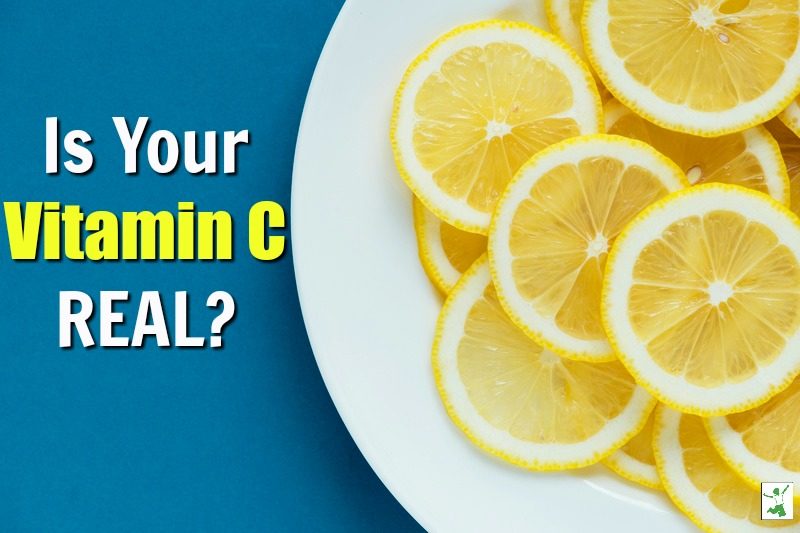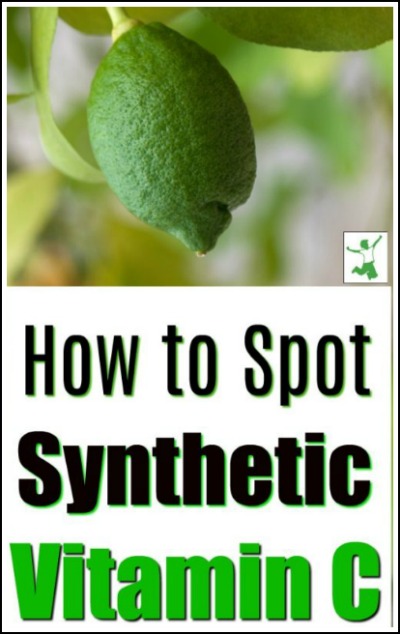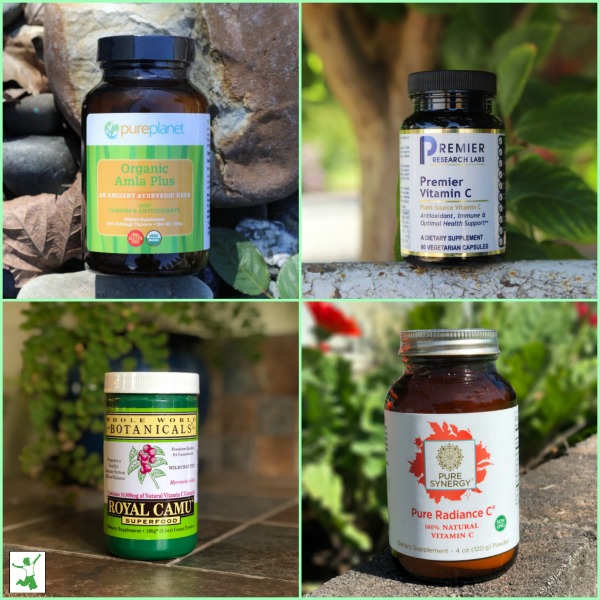Table of Contents[Hide][Show]

Did you know that ascorbic acid is actually synthetic vitamin C? What’s more, it is usually GMO vitamin C, which means it was derived from GMO corn.
If you are learning this for the first time, it can be a rather shocking realization as almost all vitamin C supplements on the market use isolated ascorbic acid separated from a whole food source. The manufacturing process that produces synthetically derived vitamin C leaves all the beneficial co-factors behind!
Even more disturbing, ascorbic acid is frequently marketed as natural vitamin C and added to organic foods as a natural preservative. Truly natural forms of vitamin C and synthetic ascorbic acid seem to be used interchangeably.
How confusing for the consumer!
Nearly all juices and fruit products are loaded up with ascorbic acid, even many organic, healthfood store versions. It seems that if a product is labeled “high in Vitamin C”, consumers buy more of it.
A lot of folks are being fooled by these misleading semantics. There is a growing body of evidence that those consuming high doses of ascorbic acid should have reason to worry.
Three Studies Suggest Caution with High Dose Ascorbic Acid
The journal Wise Traditions cites three studies that give pause about large doses of vitamin C. The first, from the Jun 15, 2001 issue of Science, showed that “synthetic vitamin C may contribute to the formation of genotoxins that can lead to cancer”.
A second study presented to the American Heart Association showed a link between consumption of only 500 mg of vitamin C per day and a greater propensity toward thickening of the arteries (Los Angeles Times, March 3, 2000).
More recently, athletes taking 1000 mg of isolated ascorbic acid per day showed reduced endurance capacity from interference with antioxidant enzymes (American Journal of Clinical Nutrition, Jan 2008).
This information should give pause to anyone who is actively taking synthetic vitamin C supplements such as those Emergen-C packets that are available everywhere, from pharmacies and health food stores to even gas stations!
Supplements like these are NOT boosting immunity and are NOT good for you!
Synthetic vitamins such as ascorbic acid act more like drugs in the body rather than whole food nutrients with all the available co-factors. Taking any synthetic vitamin can cause imbalances in the body and should be avoided.
Another worrisome and popular trend is the recommendation of some alternative health professionals to do a “vitamin C flush” during illness. This therapy (if you can call it that) calls for large doses of ascorbic acid until the onset of diarrhea.
This approach to regaining wellness has never made any sense to me. Now, with more studies indicating the danger of high doses of vitamin C, caution seems well-founded.
Fan of Linus Pauling? Consider This…
If you are a fan of Linus Pauling who popularized the notion of huge doses of Vitamin C for the common cold in the 1970s, consider this. GMO Vitamin C did not exist when Pauling was conducting his studies. GMO derived Vitamin C is what most people are unwittingly taking today!
What’s more, the studies indicating the danger of high doses of vitamin C over long periods of time had not been done yet. They were conducted long after Pauling died in 1994.
What about High Dose, Intravenous Ascorbic Acid?
What about high dose, intravenous ascorbic acid for the very ill? Note that vitamin C for IV use is almost always derived from GMO corn as well as being extremely high dose and synthetic ascorbic acid only.
Under certain circumstances and for the very ill, high dose GMO ascorbic acid therapy can be beneficial. For example, my husband used IV ascorbic acid therapy immediately after each amalgam removal. This prevented any released mercury from getting stored in the tissues. Not doing this risks the development of autoimmune disease.
However, synthetic vitamin C especially when genetically modified shouldn’t be a regular feature in anyone’s diet or supplement regimen.

Whole Food Vitamin C is Naturally Low Dose
The best way to get vitamin C on a daily basis is from whole foods sources. This will provide you this critical nutrient at a low dosage that will do no harm over the long term.
When you get the whole foods version of vitamin C, you don’t need much at all. A truly natural vitamin C supplement with no isolated ascorbic acid is naturally low-dose and yet highly effective.
Don’t forget about the benefits of fresh grassfed milk – a great source of vitamin C. The vitamin C in milk is mostly destroyed by pasteurization, along with many other nutrients. This is why buying fresh and local is so important.
Fresh and lacto-fermented fruits and vegetables (such as traditional sauerkraut) are other excellent sources of the whole vitamin C complex.
Perhaps folks feel the need to take large doses of synthetic vitamin C because all the processed foods they are eating are so devoid of the nutrient in its whole form. Switching to whole foods and dumping those vitamin C supplements in the trash would be a much better approach to boosting immunity!
Ascorbic Acid is Usually from Genetically Modified Corn
What’s worse is that ascorbic acid is not just synthetic. Remember that it is also usually derived from genetically modified corn! More on that GMO vitamin C travesty fooling millions of consumers every single day in the linked article.
Another vitamin scam harming consumers concerns synthetic folate commercially known as folic acid.
The pushing of beta carotene as true vitamin A by food manufacturers and supplement companies is another nutritional falsehood scamming millions of consumers and worse, seriously harming their health.
What to Look for in a True Vitamin C Product
To give you some idea of what to look for in a vitamin C supplement, here are the ingredients of the one I use. Notice that there is no isolated ascorbic acid or other ascorbates and no additives. Just pure food Vitamin C sources. Please note that this is not the only Vitamin C supplement that qualifies as totally pure. There are a few others.
Pure Radiance C ingredients: camu camu berry extract, manioc root, acerola berry extract, amla berry extract, buckwheat sprouts, freeze-dried berry blend, blueberry, raspberry, cranberry, cherry, rose hips fruit, lemon peel, black pepper berry extract.
I also use the Amla C Plus. Here are the ingredients: Organic Amla berry, organic spirulina.
Notice that the words “ascorbic acid” are not listed in either of these products!
Want to know where to find a complete line of whole food Vitamin C supplements from a variety of whole food plant sources?
Click here for several carefully vetted brands to choose from.









I wonder what about organically sourced mega liposomal vitamin C supplements? I have a five year old with brain cancer who takes this regularly as a daily supplement. It says it ises non gmo derived ingredients.
If it’s organic, at least it’s nonGMO vitamin C. That’s a huge improvement. What does the ingredients list say? If it says ascorbic acid and doesn’t list whole foods like acerola cherry, then it is synthetic even though organic.
The sad thing is a lot of people are mercury toxic these days, that’s what is causing all the food intolerances. Mercury from silver fillings, tuna fish,vaccines, occupational.
Most people need 4-8 grams of c per day with meals to combat the oxidative stress caused by mercury. The only way to get this amount of vit c is abscorbic acid.
Your comment made me smile, Just proves God was speaking to you in that dream, I’m on the same path from converting from synthetic VitC to using what God gave us. His given us everything we need in nature for healing and for our enjoyment 🙂 Jesus Bless you
Evan small amounts of artificial vitamin C supplements make me feel tired and out of sorts. But I can eat a lot of citrus and sweet peppers and I feel fine.
Another disturbing trend that deserves investigation – nearly all dry dog foods use artificial vitamin C. This is bothersome not only because it’s artificial, but also because dogs (and cats) produce their own vitamin C. If someone locates a dry dog food that doesn’t contain any added vitamin C, please let me know.
Camu camu is not natural either. It is dried and concentrated.. Who can tell if it is still good for us? I am just trying to keep the same logic here..
Since you are comparing synthetic and natural vitamin C at the molecular level, you need to consider more than the elements and bonds that make up the molecule. You need also consider such things as the direction of the molecular rotation. You also need to consider what elements are included in a food that naturally contains the vitamin. These elements, that are not going to be included in any supplement but whole food supplements, are essential for the proper utilization of the vitamins in the body.
I think a regular size lemon has more than 175 mg if vitamin c. I looked it up the other day. Several months ago I had a dream of driving past tons of huge lemons growing in an Orchard. That’s good enough to me to prove that lemons will be the best source of vitamin c for me.:)
Most prominent side effect of synthetic vitamin C long term use is ‘Kidney Scarring’ leading after few years to kidney damage.
I have reading through all the comments and a couple people have asked and not yet had an answer about camu camu powder and I am wondering too Sarah if you feel we can be confident if buy it that it indeed does have the amount of Vit c that it claims to provide on the package even after it is dried and packaged. Do you know how they determine that. Is there any test one could do on the powder to know. Also I have bought rosehip powder and orange peel powder etc. from Mountain Rose Herbs and wondering if those are good sources especially if they have been in a jar for a while.
Thank you for this, it was super helpful. And thank you for recommending a good product since I’ve been looking for one that wasn’t garbage. Most sites just say “contains 100% vitamin C,” which is like calling a product “natural.” It just means nothing.